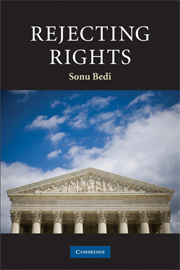Book contents
- Frontmatter
- Contents
- Acknowledgements
- Table of cases
- Introduction
- Part I Rights
- Part II Justification in theory
- Part III Justification in practice
- 6 Rejecting the constitutional rights to property and religion
- 7 Rejecting the constitutional right to privacy
- 8 Equal protection and judicial review
- Conclusion
- Bibliography
- Index
7 - Rejecting the constitutional right to privacy
Published online by Cambridge University Press: 01 July 2009
- Frontmatter
- Contents
- Acknowledgements
- Table of cases
- Introduction
- Part I Rights
- Part II Justification in theory
- Part III Justification in practice
- 6 Rejecting the constitutional rights to property and religion
- 7 Rejecting the constitutional right to privacy
- 8 Equal protection and judicial review
- Conclusion
- Bibliography
- Index
Summary
By looking entirely to the rationale of the law we also do not need the right to privacy. The normative arguments of Part II find constitutional life in the Court's privacy jurisprudence. Lawrence v. Texas (2003), the recent Supreme Court case deeming gay sodomy laws unconstitutional, is the central component of this argument. I contend that a resuscitated rational, single-tier of review is sufficient to do the constitutional work. I argue that a repudiation of morals legislation – legislation that seeks to minimize some non-demonstrable harm – renders the right to privacy and the ensuing need for more exacting scrutiny obsolete.
Like “neutrality,” “morals legislation” is on its face a misleading term. Of course, all laws are based on some kind of morality. Caring only about demonstrable harm is a moral stance. By morals legislation, I do not mean all legislation based on morality. That would be an easily defeated position. Rather morals legislation or mere morality is proxy for the refusal to endorse the condition of demonstrability. Morals legislation is legislation that does not pick out some publicly ascertainable harm. Rather, it is legislation whose justification rests on some non-demonstrable harm: gay sex is disgusting or wrong, marriage between individuals of different hair colors is sinful and the like. I argue that rejecting such rationales, requiring that the state only minimize publicly ascertainable harm, opens the way for the rejection of privacy.
This chapter is in three parts.
- Type
- Chapter
- Information
- Rejecting Rights , pp. 145 - 164Publisher: Cambridge University PressPrint publication year: 2009



